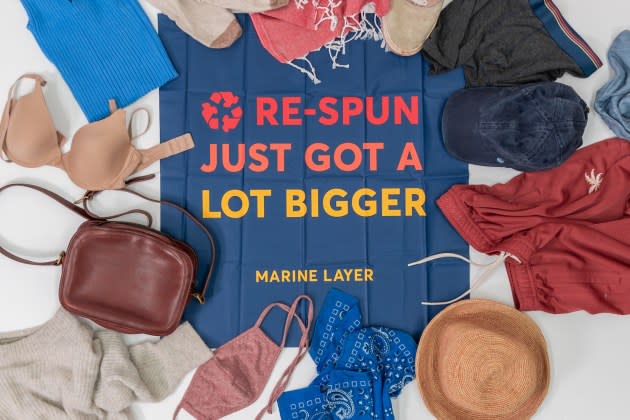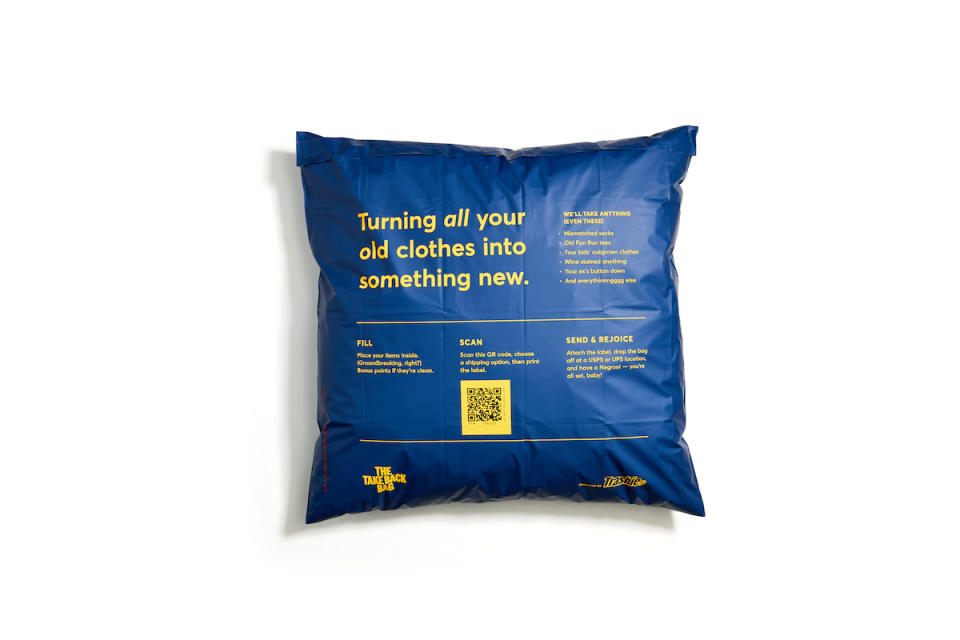Marine Layer Teams with Trashie to Scale Clothing Recycling

Just days into launching and Trashie has found itself another partner.
The recycling and rewards platform from the minds behind For Days has joined forces with Marine Layer to bring an expanded clothing recycling service to its customers. The collaboration merges Marine Layer’s Re-Spun program—which launched in 2018 to give T-shirts a second life—with Trashie’s Take Back Bag program, which offers customers a convenient way to recycle unwanted textiles.
More from Sourcing Journal
Trashie Brings Recycling to the Masses-And Pays You To Do It
Denmark's First Major Textile Recycling Project Makes Headway
“The most exciting part is just growing this behavior and having it kind of embed and be on repeat,” Kristy Caylor, Trashie’s co-founder and CEO, told Sourcing Journal. “Consuming is a part of life—it’s joyful—but if we can make the impact of that less, there’s a lot of opportunity.”
Consumers simply purchase a Re-Spun Take Back Bag for $20 from the San Francisco-based sustainable brand’s website, fill it with any and all discarded textiles—including shoes, purses and linens—and then mail the bag back to Trashie via a pre-paid shipping label. In turn, customers receive $40 to spend with Marine Layer.

“Marine Layer and the team at Trashie have been pioneering circularity for years,” Michael Natenshon, founder and CEO of Marine Layer, said. “Partnering to launch the Re-Spun Take Back Bag is a remarkably simple and efficient way for us to scale recycling while continuing to evolve fiber-to-fiber innovation.”
Once Trashie receives the bag, the New York-based startup’s platform sorts and grades all collected materials onshore into over 250 grades—think of it as the “best matchmaking service for textiles,” Caylor explained.
“Everything that we collect goes through a major category code, and by the time they work their way through the system, they end up in one of 253 buckets,” she continued. “Those buckets then have something that can be done with them and it’s really specific, and that’s why the process is so important—because it means that each of those materials finds its next best and highest use.”
As a result, 90 percent of collected items are diverted from landfills by being properly channeled to either reuse, downcycling or fiber-to-fiber recycling.
By aggregating those collected items from both Trashie’s partners as well as DTC programs, the company can recycle more efficiently than if it were operating in a silo—meaning that in the case of recycling, quantity is not necessarily better than quality, but is certainly essential to running a process.
“If you ask people to just send back a T-shirt or a pair of jeans, the quantity that’s sent back is always going to be smaller because that’s the siloed piece of it,” Caylor said. “The recycling process requires quantity. That’s why I say we use holey jeans; we just want a bunch of them.”
Plus, Trashie’s impact dashboard will enable Marine Layer to track recycling volumes in real time, generating metrics on relevant data like landfill diversion, water savings and carbon emission reductions.
“It’s really a nice way of quantifying their impact,” Taylor said of the impact dashboard.
And while Marine Layer’s initial Re-Spun program centered around recycling old tees for store credit—over 500,000 T-shirts were diverted from landfills and customers received more than $2 million in credit to date—partnering with Trashie will give the sustainable brand even more results. As in, recycling rates are up by an estimated 400 percent kind of results.
“We believe in the power of collaboration and innovation to drive sustainable change,” Caylor said. “Our partnership with Marine Layer allows us to collectively make a tangible impact on the environment and reshape how people perceive clothing recycling.”

